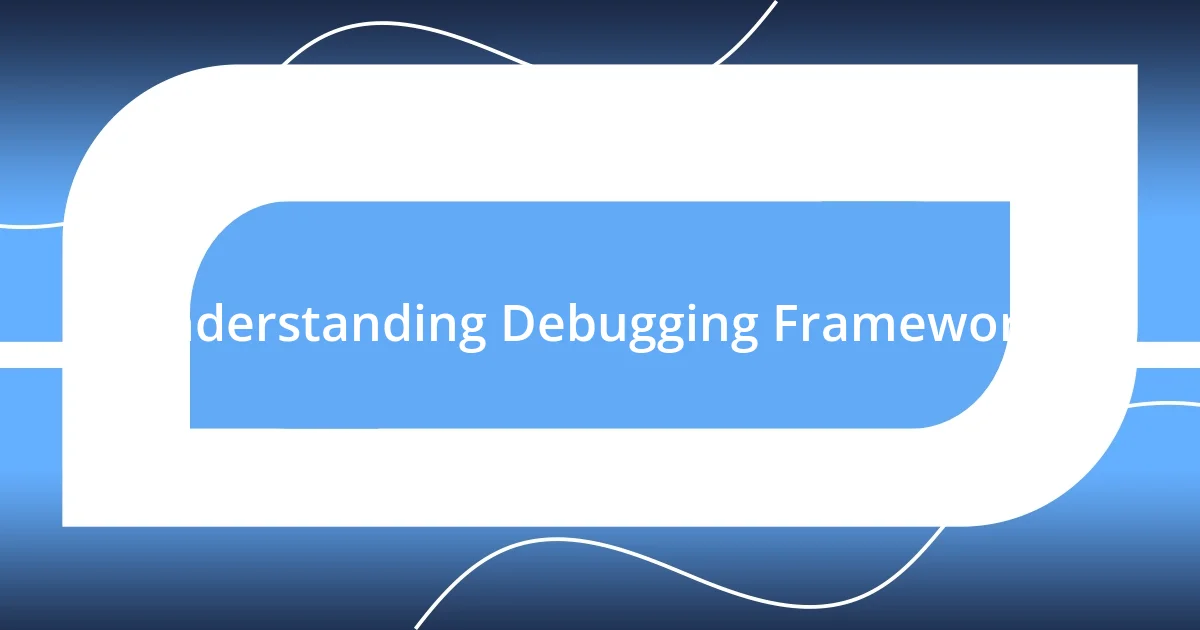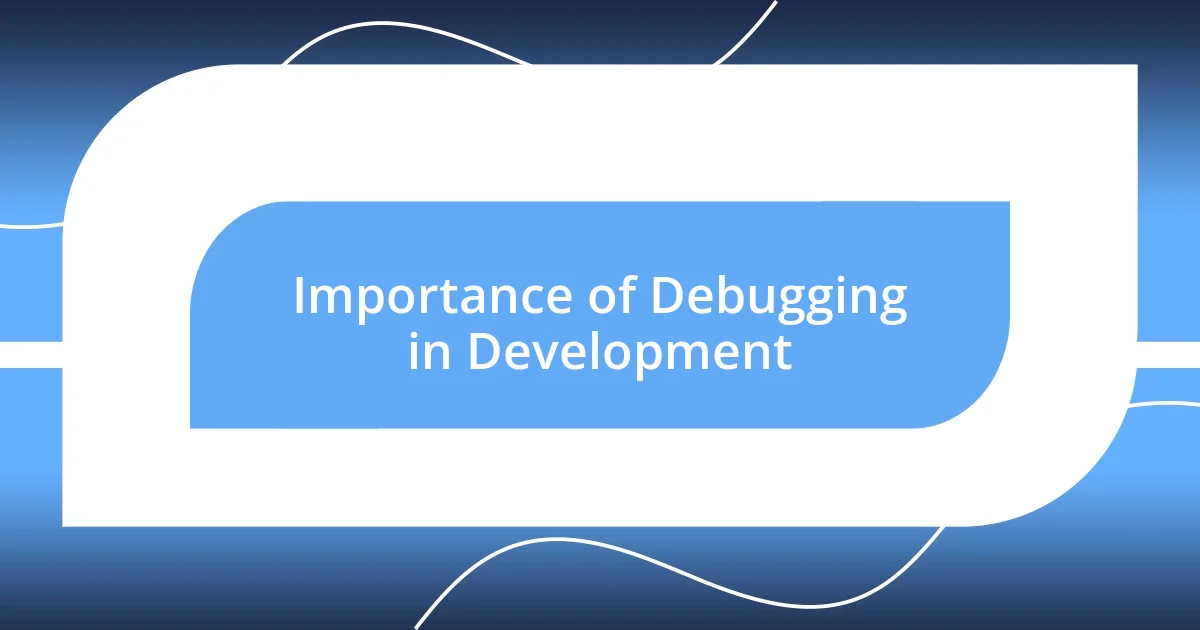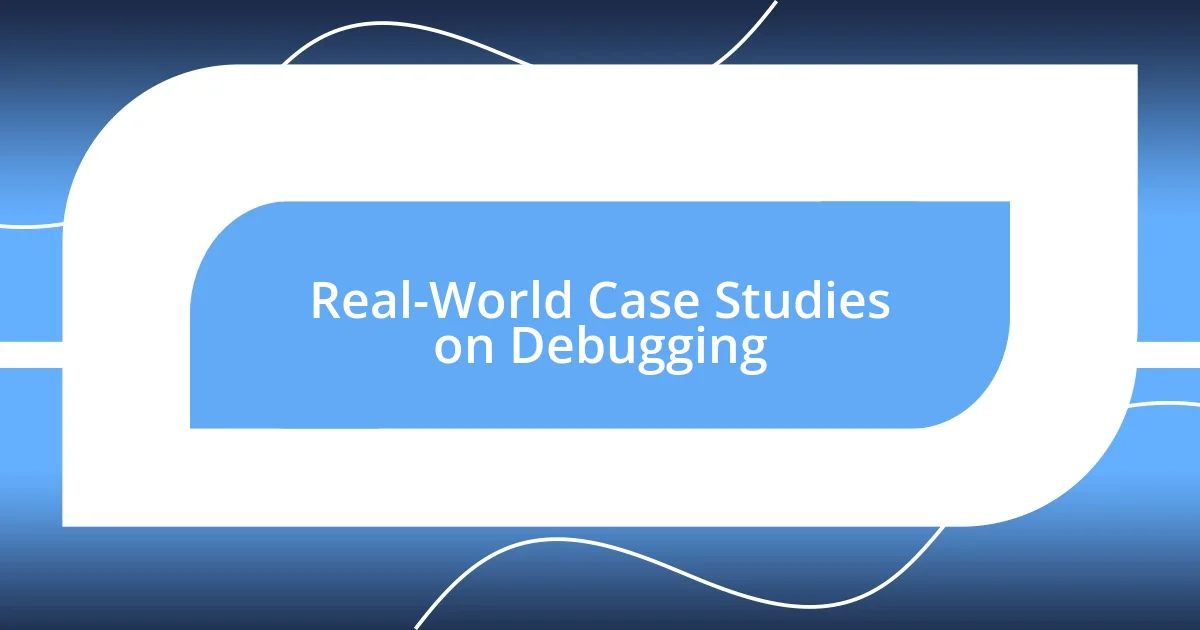Key takeaways:
- Debugging frameworks enhance error identification and provide valuable context, transforming a frustrating process into a learning experience.
- Collaboration and communication within a team significantly improve debugging outcomes and foster a culture of shared knowledge and problem-solving.
- Documenting the debugging process and maintaining consistent environments are crucial for efficient troubleshooting and long-term development success.

Understanding Debugging Frameworks
Debugging frameworks are essential tools that streamline the process of identifying and fixing errors in code. I remember the first time I delved into a debugging framework; it was like magic—watching those pesky bugs highlight themselves in real-time. Have you ever felt like you were searching for a needle in a haystack? That’s what traditional debugging felt like before I embraced these frameworks.
One of the most remarkable aspects of debugging frameworks is their ability to provide context around errors. For instance, when I encountered a particularly tricky issue, the framework not only pinpointed the error location but also offered hints on what might have gone wrong. It’s almost as if they serve as a guiding hand, gently steering you towards a resolution.
These frameworks often include features like logging and breakpoints, which allow for deeper insights into code execution. I find myself reflecting on how these tools transform a once frustrating experience into a learned moment. Doesn’t it feel satisfying to know that you have a reliable companion in the debugging journey? It’s a humbling reminder that even the most skilled developers rely on these frameworks to enhance their efficiency and effectiveness.

Importance of Debugging in Development
The importance of debugging in development cannot be overstated. I remember a project where a minor bug caused a complete application meltdown. It was such a teachable moment for me, witnessing how a single oversight could unravel weeks of work. Debugging not only helps identify issues, but it also enhances my problem-solving skills, making me a better programmer overall.
Each debugging session feels like peeling back layers of an onion; I discover something new each time. The lessons learned during these moments often extend beyond just fixing bugs—they spark creativity and promote a deeper understanding of application logic. I’ve found that when issues arise, it’s a fantastic opportunity to challenge my assumptions and really rethink my approach to coding.
Moreover, debugging instills confidence in my development endeavors. Knowing I can tackle and resolve issues makes me more willing to experiment and innovate in my projects. Do you ever feel that sense of accomplishment when you resolve a complex bug? That rush is a testament to the importance of debugging in unleashing a developer’s potential.
| Debugging Benefits | Details |
|---|---|
| Enhances Problem-Solving Skills | Each bug provides a unique challenge and an opportunity to improve analytical thinking. |
| Promotes Understanding of Code | Debugging leads to deeper insights about how code interacts, enhancing overall coding ability. |

Common Challenges with Debugging Frameworks
Debugging frameworks can often present several challenges that can be quite frustrating. I recall a project where I spent endless hours trying to navigate through a complex bug, only to realize that the framework didn’t always capture the error states accurately. It was like trying to solve a puzzle with missing pieces, leaving me feeling overwhelmed. The reality is that these tools sometimes struggle to provide clear insights, especially in intricate systems where dependencies can spiral out of control.
Here are a few common challenges I’ve encountered while debugging with frameworks:
- Inconsistencies in Error Reporting: One bug might surface as multiple issues depending on the context or environment, leading to confusion.
- Steep Learning Curve: Some frameworks come with extensive features, which can be daunting for newcomers trying to grasp their functionality.
- Performance Overheads: Occasionally, the frameworks themselves can introduce slowdowns in the application, making it difficult to determine whether the issue lies in the code or the debugging tool.
- Limited Support for Certain Languages: Not all frameworks are universal, and I’ve experienced moments when I was left without adequate tools for niche programming languages.
Tackling these hurdles has shaped my approach to problem-solving. While trying to debug a particularly elusive issue, I often find myself wishing for a more intuitive interface or documentation that actually paves the way for understanding the tool better. However, overcoming these challenges ultimately enhances my resilience and expertise, allowing me to grow and adapt as a developer.
Debugging frameworks may also sometimes hinder rather than help, leading to a frustrating experience. During one session, I felt like I was on an emotional rollercoaster, oscillating between hope and despair as I tried to decipher the stack traces. It’s almost like you develop a love-hate relationship with these tools; they can either be your best friend or worst enemy on any given day. When the results aren’t coherent, it adds layers of stress to an already taxing process.
- Complex Setup Requirements: The initial setup can be time-consuming and may require deep familiarity with the system.
- False Sense of Security: Relying too heavily on automated tools might lead to overlooking manual checks, creating vulnerabilities.
- Difficulty in Contextualizing Errors: Sometimes, the frameworks will show an error but not provide enough context, forcing me to dig deeper without guidance.
Through these experiences, I’ve learned the importance of complementing my debugging strategies with thorough documentation and community forums. It’s all about finding that balance and honing my skills in tandem with these frameworks, rather than being solely dependent on them. Each challenge becomes a lesson, fostering a deeper understanding of both the tools at my disposal and the intricate landscape of programming itself.

Best Practices for Debugging Frameworks
Best practices in debugging frameworks significantly elevate the problem-solving process. One practice I’ve found invaluable is ensuring that logs are consistently detailed and meaningful. I recall being knee-deep in debugging when a fellow developer mentioned adding more context to our logging framework. Taking that advice transformed our ability to pinpoint issues quickly. Having clear and concise error messages doesn’t just aid troubleshooting—it empowers the entire team to understand problems better when they arise.
Another strategy I advocate is pairing manual testing with automated debugging tools. After a particularly tough debugging experience, where automated reports left me scratching my head, I started employing manual checks alongside. The results were eye-opening. With manual tests, I wasn’t just waiting for a tool to tell me where things went wrong; I was actively engaging with the code, gaining insights that automated systems often miss. This dual approach not only clarifies the situation but fosters a deeper connection with the code.
Lastly, involving the whole team in the debugging process has been a game-changer. I vividly remember a debugging session where my peers and I gathered around a whiteboard to brainstorm solutions. Sharing different viewpoints not only speeds up resolution but also builds a culture of collaboration and learning. Have you ever experienced the thrill of a group ‘Eureka’ moment? Those moments remind me that debugging isn’t just about finding flaws—it’s also about weaving a tighter team bond with shared knowledge and experience.

Real-World Case Studies on Debugging
The journey of debugging frameworks can really showcase some incredible learning moments. For instance, I once tackled a tricky problem in a large-scale application where an error would only pop up under specific conditions. After countless hours of frustration, I discovered that the core issue was a mismatched version of a library that was incompatible with our framework. It was a real ‘Aha!’ moment, highlighting the importance of maintaining consistent environments—something I now take extra care to document. Have you ever had a similar experience where the smallest detail made all the difference?
I also remember a case where the debugging framework’s performance lagged created chaos during a live demo. My heart raced when I realized the tool was delaying error feedback, giving the impression that our application was malfunctioning, while it was actually the framework slowing things down. This incident taught me the hard way that I needed to communicate clearly with my team about these dependencies—after all, clear communication can be just as vital as the code we’re working on. Has anything like that ever thrown you off during a crucial presentation?
Reflecting on these experiences, I can’t help but feel gratitude for the lessons learned through debugging frustrations—each setback has turned into a stepping stone. One notable instance involved collaborating with a colleague who specialized in a different programming language. We faced a cryptic error that stumped both of us, but discussing it together led to an unexpected breakthrough: a deep-dive into how different frameworks manage memory. It was exhilarating! Have moments like that enriched your understanding of debugging frameworks too?

Lessons Learned from Debugging Experiences
Debugging has taught me that patience is not just a virtue—it’s a necessity. I distinctly remember a night when a simple typo held me hostage for hours. I was frustrated, feeling like I was chasing my tail. Eventually, I realized that stepping away for a moment and returning with fresh eyes led me to the solution. Have you ever noticed how sometimes, a little distance from the problem can reveal the answer?
Another lesson that sticks with me is the importance of documenting my debugging process. In one project, I thought I could rely on my memory to recall the myriad steps I took to resolve issues. However, when similar bugs resurfaced, I found myself retracing my steps without any guidance. By keeping a log of my thought process and the fixes, I’ve developed a reference that not only saves time but also builds a roadmap for future troubleshooting. How useful would it be for you to have that kind of resource at your fingertips?
Collaboration remains one of the most enriching lessons from my debugging endeavors. There was a moment when I paired with a junior developer to tackle a persistent bug. Seeing their fresh perspective illuminated aspects I had overlooked, giving us the breakthrough we needed. Their enthusiasm reminded me how vital diverse viewpoints are in problem-solving. Have you ever had a similar experience where a team member’s insight was precisely what you needed?














